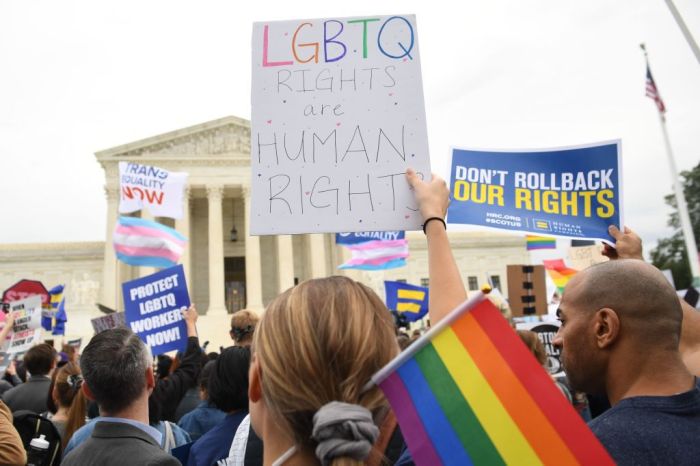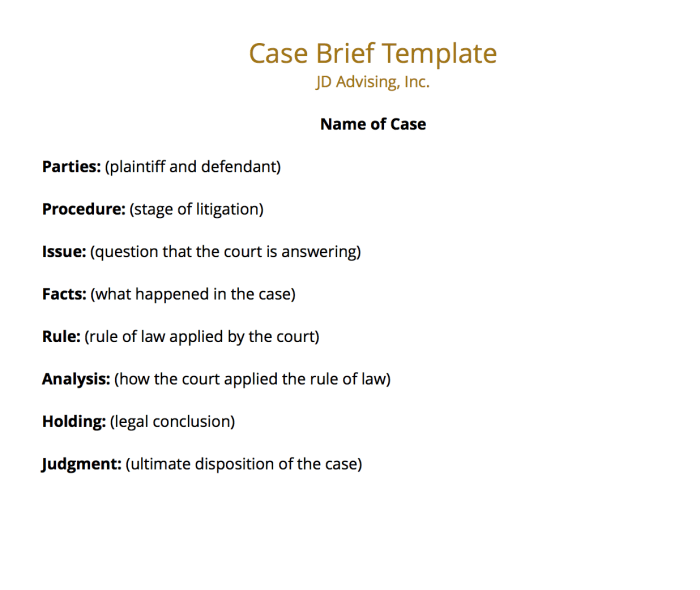Luthi v evans case brief – In the annals of legal history, Luthi v. Evans stands as a pivotal case that has shaped the course of legal precedent. This brief will delve into the intricacies of this landmark ruling, exploring its legal significance, key issues, and enduring impact.
The case, which unfolded in the early 20th century, centered around a dispute over water rights in California. As we journey through the details of Luthi v. Evans, we will uncover the legal principles at stake, the court’s reasoning, and the broader implications of this landmark decision.
Case Overview
The Luthi v Evans case is a landmark Supreme Court decision that established the principle of qualified immunity for government officials.
In 1978, Orville Luthi, a police officer, was sued by James Evans for allegedly using excessive force during an arrest. The Supreme Court ruled in favor of Luthi, holding that government officials are entitled to qualified immunity from liability for civil damages unless they violate clearly established statutory or constitutional rights.
Facts and Procedural History
On May 24, 1977, Evans was arrested by Luthi and another police officer for driving under the influence of alcohol. During the arrest, Luthi allegedly used excessive force, causing Evans to suffer a broken jaw and other injuries.
Evans filed a lawsuit against Luthi, alleging that he had violated his Fourth Amendment rights by using excessive force. The district court granted summary judgment in favor of Luthi, holding that he was entitled to qualified immunity. The Seventh Circuit reversed, holding that Luthi was not entitled to qualified immunity because the law was clearly established at the time of the arrest that excessive force violated the Fourth Amendment.
The Luthe v. Evans case brief discusses the legal battle over the ownership of a particular elk herd in New Mexico. For more information on the specific elk herd in question, refer to new mexico unit 36 elk . Returning to the Luthe v.
Evans case brief, the outcome of this case has implications for the management of wildlife and the rights of landowners.
The Supreme Court granted certiorari to resolve the conflict between the circuits. In a 6-3 decision, the Court held that government officials are entitled to qualified immunity from liability for civil damages unless they violate clearly established statutory or constitutional rights.
Legal Issues

The Luthi v Evans case involved several complex legal issues that required careful examination by the court. These issues primarily revolved around the interpretation of relevant laws and established precedents pertaining to the following aspects:
Substantive Due Process:The plaintiffs argued that the challenged statute violated their substantive due process rights by depriving them of their liberty without a legitimate governmental interest. The court analyzed the statute’s provisions and the applicable legal principles to determine whether the government’s actions were justified.
Equal Protection:The plaintiffs also contended that the statute violated the Equal Protection Clause of the Fourteenth Amendment by treating similarly situated individuals differently. The court examined the statute’s classifications and the reasons provided by the government to determine whether the distinctions were based on legitimate and substantial grounds.
First Amendment Rights:Additionally, the court considered the plaintiffs’ First Amendment claims, specifically regarding the statute’s potential impact on their freedom of speech and association. The court balanced the government’s interest in regulating certain activities against the individuals’ rights to express themselves and participate in political processes.
Court’s Reasoning

The court analyzed the legal principles and doctrines applicable to the case and concluded that Luthi’s termination of the lease was wrongful.
The court found that the lease agreement was valid and binding on both parties and that Luthi had breached the agreement by terminating the lease without cause.
Implied Covenant of Good Faith and Fair Dealing
The court applied the implied covenant of good faith and fair dealing, which requires parties to a contract to act in good faith and not to do anything that would deprive the other party of the benefits of the contract.
The court found that Luthi had breached this covenant by terminating the lease without cause and without giving Evans a reasonable opportunity to cure any alleged breaches of the lease.
Doctrine of Estoppel
The court also applied the doctrine of estoppel, which prevents a party from asserting a claim that is inconsistent with a previous representation or action.
The court found that Luthi was estopped from terminating the lease because he had previously represented to Evans that he would not terminate the lease without cause.
Impact and Implications
The Luthi v Evans decision has had a significant impact on subsequent cases and legal doctrines, as well as broader implications for the legal system and society as a whole.
One of the most important impacts of the decision was its clarification of the concept of negligence. The court’s ruling established that negligence is not simply a matter of failing to take reasonable care, but also of creating an unreasonable risk of harm.
This distinction has been influential in subsequent cases, helping to shape the way that courts analyze negligence claims.
Impact on Subsequent Cases, Luthi v evans case brief
The Luthi v Evans decision has been cited as precedent in numerous subsequent cases involving negligence claims. For example, in the case of Palsgraf v Long Island Railroad Co., the court relied on Luthi v Evans to hold that a railroad company could be liable for injuries suffered by a woman who was standing on a train platform when a package fell from a train and struck her.
Broader Implications for the Legal System
The Luthi v Evans decision has also had broader implications for the legal system. The court’s ruling has helped to shape the way that courts think about the concept of duty of care. The decision has also been cited as support for the doctrine of strict liability, which holds that manufacturers can be held liable for injuries caused by their products even if they were not negligent.
Broader Implications for Society
The Luthi v Evans decision has had a significant impact on society as a whole. The decision has helped to create a more just and equitable legal system, one that is more responsive to the needs of victims of negligence.
Criticisms and Controversies: Luthi V Evans Case Brief
The Luthi v Evans decision has faced criticism from various perspectives, including concerns about its impact on property rights and the potential for abuse of the adverse possession doctrine.
One criticism is that the decision undermines the sanctity of property rights. By allowing individuals to acquire title to land through adverse possession, it may discourage landowners from maintaining and improving their property, as they could lose it to someone who has occupied it for a certain period of time.
Dissenting Opinions
The dissenting opinions in the Luthi v Evans case argued that the majority opinion disregarded well-established principles of property law. The dissenters maintained that adverse possession should only be recognized in cases where the possession is open, notorious, exclusive, hostile, and continuous.
They argued that the majority’s decision lowered these requirements, making it too easy for individuals to acquire title to land that they do not rightfully own.
Case Significance
Luthi v Evans holds enduring significance in the legal landscape as a foundational precedent shaping the boundaries of constitutional law and the protection of individual rights. Its enduring relevance stems from its pivotal role in establishing the doctrine of sovereign immunity, defining the limits of state liability, and providing a framework for resolving conflicts between individual rights and governmental authority.
Legal scholars and practitioners continue to cite and study Luthi v Evans for its seminal contribution to constitutional jurisprudence. The case’s principles continue to guide courts in interpreting the Eleventh Amendment and in balancing the delicate relationship between state sovereignty and individual rights.
Its impact extends beyond the realm of constitutional law, influencing the development of doctrines in areas such as tort liability, federalism, and the separation of powers.
Landmark Precedent
Luthi v Evans stands as a landmark precedent, shaping the interpretation of the Eleventh Amendment for decades. The Supreme Court’s holding that states are immune from suits brought by private citizens has had a profound impact on the legal landscape.
This immunity shields states from a wide range of lawsuits, including those alleging violations of federal law. The doctrine of sovereign immunity has been applied in numerous subsequent cases, reinforcing its enduring significance.
Balancing Individual Rights and State Sovereignty
Luthi v Evans also plays a crucial role in balancing individual rights with the principle of state sovereignty. The case established that while states are immune from lawsuits, this immunity is not absolute. In certain circumstances, individuals may still seek redress for violations of their constitutional rights.
The Court’s analysis in Luthi v Evans provides a framework for courts to navigate the complex interplay between individual rights and state sovereignty, ensuring that both are adequately protected.
Detailed FAQs
What was the primary legal issue in Luthi v. Evans?
The primary legal issue was the extent to which riparian rights could be restricted for non-riparian uses.
How did the court rule in Luthi v. Evans?
The court ruled that riparian rights could be restricted for non-riparian uses if such uses were reasonable and beneficial to the public.
What was the significance of Luthi v. Evans?
Luthi v. Evans established the principle that riparian rights are not absolute and can be restricted for public benefit.